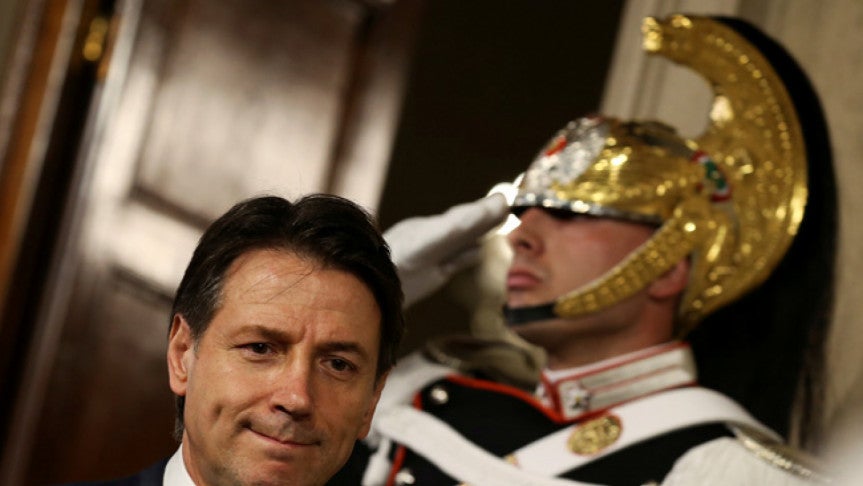Italy’s efforts to form govt fail as president defends euro

Rome: Efforts to form a coalition government collapsed on Sunday after the Italian president rejected a eurosceptic pick for the key economy ministry, triggering a possible constitutional crisis and opening the prospect of fresh elections.
The leaders of the two parties trying to field a government, the far-right League and anti-establishment 5-Star Movement, accused President Sergio Mattarella of abusing his authority and working under the orders of European powers.
5-Star leader Luigi Di Maio, whose party won the most seats at an inconclusive March 4 vote, demanded that parliament impeach Mattarella, raising the spectre of political turmoil in the euro zone’s third biggest economy.
Financial markets tumbled last week on fears the mooted coalition would unleash a spending splurge and increase Italy’s already huge debt mountain, which is equivalent to more than 1.3 times the nation’s domestic output.
Looking to allay investor concerns, Mattarella vetoed on Sunday the choice of 81-year-old economist Paolo Savona, a vocal critic of the single currency, to the pivotal economy post.
Prime Minister-designate Giuseppe Conte promptly abandoned his efforts to form a government.
In a sombre, televised speech, Mattarella said he had accepted all the suggested ministers bar Savona.
‘I asked for that ministry an authoritative political figure from the coalition parties who was not seen as the supporter of a line that could provoke Italy’s exit from the euro,’ he said.
Shortly afterwards, he summoned former International Monetary Fund (IMF) senior official Carlo Cottarelli for a Monday morning meeting—an indication he may be considering asking him to head a government of unelected technocrats.
Voter Anger
Cottarelli would be a calming choice for the financial markets, but any technocrat administration would likely only be a short-term solution because the majority of parliamentarians have said they would not support such a government.
If he failed to win parliamentary backing, Cottarelli would stay in office in a caretaker capacity ahead of elections that would most likely be held in September or October.
Polls have suggested that the League, which won 17 percent of the vote in March, would see its support surge in any early ballot, while support for 5-Star remained strong. Mainstream centre-left and centre-right parties were seen losing further ground in the face of voter anger over the sluggish economy.
League leader Matteo Salvini responded furiously to Mattarella’s refusal to rubberstamp Savona.
‘If there’s not the OK of Berlin, Paris or Brussels, in Italy a government cannot be formed. It’s a folly, and I ask the Italian people to stay close to us because I want to bring democracy back to this country,’ Salvini told reporters.
News of Mattarella’s veto sent a shockwave through Italy.
The leader of the nationalist Brothers of Italy party, which had an electoral pact with the League, said the head of state should be impeached, accusing him of abusing his position.
‘We will ask parliament to charge Mattarella with high-treason because he has acted under foreign pressure,’ Brothers of Italy chief Giorgia Meloni said on La7 television channel.
The 5-Star’s Di Maio also demanded impeachment under article 90 of the constitution. Under that clause, parliament can demand a president leave office if a simple majority of lawmakers votes in favour. The constitutional court would then be called to decide whether to impeach or not.
‘After tonight, it’s truly difficult to believe in the institutions and the laws of the state,’ Di Maio said.
Experience
On Friday, the closely watched gap between the Italian and German 10-year bond yields, seen as a measure of political risk in the euro zone, was at its widest in four years at 215 basis points.
After markets had closed on Friday, Moody’s said it may downgrade the country’s sovereign debt rating because of the risk that the would-be government would weaken public finances and roll back a 2011 pension reform.
Facing Mattarella’s veto, Savona tried on Sunday to allay concerns about his views in his first public statement on the matter.
‘I want a different Europe, stronger, but more equal,’ Savona said in a statement.
He also said his position on debt was the same as that forged by the potential coalition allies in their programme - which says it will be reduced not through austerity or tax cuts, but through targeted investments and policies that boost economic growth.
Savona has had high-level experience at the Bank of Italy, in government as industry minister in 1993-94, and with employers’ lobby Confindustria. But his critical stance on the euro has been the focus of concern.
In Sunday’s statement Savona did not mention his opinions on the euro, but more than 70 slides outlining a ‘plan B’ for Italy’s exit from the euro, co-authored by Savona in 2015 with a dozen others, circulated on social media.

 Reuters
Reuters




